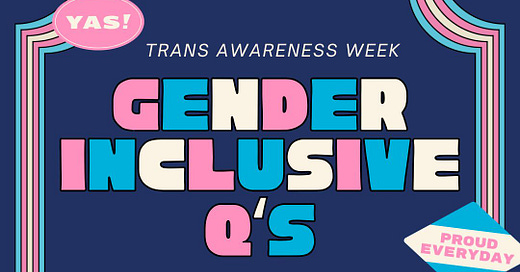During Trans Awareness Week, Let's Address Erasure...
When it comes to demographic data collection, dated binary gender options ("male" and "female") fail to fully capture the diverse spectrum of gender identities. Learn how to avoid a common mistake...
As we celebrate Trans Awareness Week, let's delve into the issue of erasure, a prevalent experience for many trans folx. Erasure manifests in various forms, from misgendering to the absence of inclusive gender options in data collection systems.
When it comes to demographic data collection, dated binary gender options ("male" and "female") fail to fully capture the diverse spectrum of gender identities. This erasure not only obscures the experiences of transgender, nonbinary, two-spirit, intersex, and gender-expansive people, but also hinders our understanding of the unique needs and experiences of trans folx.
Organizations that have moved away from binary gender questions often opt for seemingly inclusive options that still perpetuate erasure. Questions like: "Describe your gender: A) Female, B) Male, C) Nonbinary" fail to recognize trans women and trans men who get aggregated with cisgender women and cisgender men, and they completely fail to account for other gender identities when responding to a question like this one, further marginalizing us.
As a trans man, I yearn to see fully gender inclusive data that reflects the experiences of trans women, trans men, two-spirit, nonbinary, intersex, and gender expansive people. This granularity would provide valuable insights into the distinct realities of these groups, enabling us to better address our specific workplace needs.
Organizations that embrace more comprehensive gender identity options in their data collection practices gain a competitive edge in fostering inclusive and multicultural workplaces. They demonstrate their commitment to understanding and supporting the diverse experiences of their employees.
Throughout my career, I've had the privilege of collaborating with the UCLA Williams Institute to inform gender data collection best practices. Their evidence-based research offers cutting-edge practices for asking more effective gender-inclusive questions. Please explore their work here: https://lnkd.in/gYvayVMA.
If you seek guidance on designing and implementing gender-inclusive questions, as well as strategies to safeguard responses to them, please drop me a DM. Together, let's design a data landscape that fully reflects the rich gender diversity of our workplaces.
Rhodes Perry’s Substack is a Belonging Membership Community-supported publication. To receive new posts and support these offerings, consider joining the Belonging Community.





Thanks Rhodes!